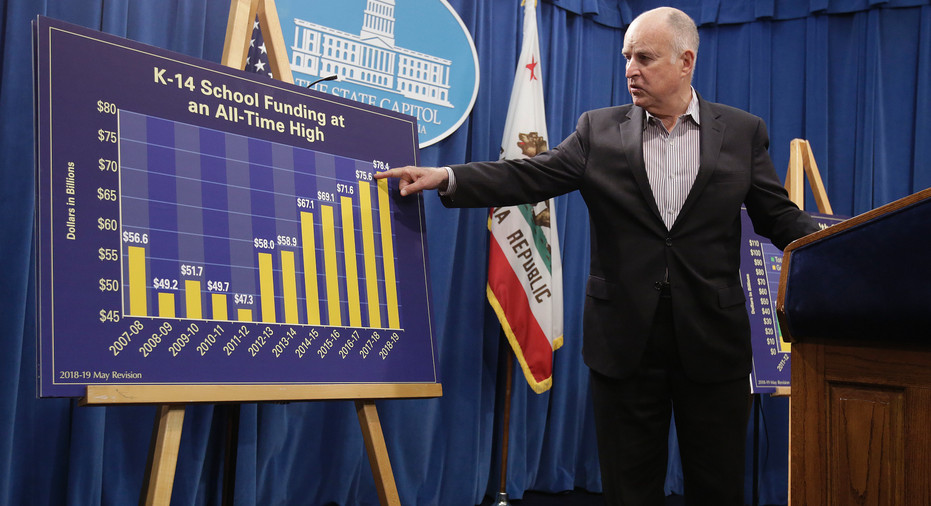California governor pitches robust budget as revenues surge

SACRAMENTO, Calif. – Gov. Jerry Brown proposed a $137.6 billion general fund budget for California Friday amid surging revenues, kicking off his last round of negotiations with Democratic legislative leaders.
Brown's latest budget is up nearly $6 billion from his earlier proposal in January. The Democratic governor wants to save most of the surplus to protect spending during a future recession, boosting California's rainy day fund to nearly $14 billion "to weather a storm that will be more like $60 billion."
The Democratic governor warned that the revenue is "not in the bank" but "it is a prediction."
"Life is very giddy at the peaks ... but I'm not giddy," he said.
Brown's revised budget projects an $8.8 billion surplus, the largest since at least the 2000-01 state budget year. The surplus increased nearly $3 billion from the figure budget officials projected in January in part because revenue during the busy April tax-filing season came in higher than expected.
Brown has repeatedly warned that California is riding a wave of economic growth and the budgetary good times will eventually end. He compared the state's usual fiscal cycle to riding a tiger, with programs expanded in good times only to be chopped during recessions and said he's determined to leave his successor a state in good fiscal condition.
He has generally resisted new ongoing spending on social services that he says can't be sustained.
"All the people who want things won't be getting what they'd like to have," Brown said, warning that the state is "on the peaks and we're about to head down into the valleys."
Still, on Friday he proposed $2 billion for infrastructure, including universities, courts, state facilities and flood control and $359 million to help local governments address homelessness.
But he's facing pressure to boost funding on a wide variety of legislative priorities including higher education, child care and firefighting.
Assembly Democrats said this week they'll push for a $1 billion boost in spending on health care, including $250 million to provide state-funded health coverage to low-income California residents living in the country illegally through the Medi-Cal program. Their proposal would also provide money to offset monthly premium costs for people who buy their own insurance coverage.
They have also proposed expanding the earned-income tax credit to help the working poor. Brown's proposal included a partial expansion for adults up to age 25 and seniors 65 and older.
"In these times of prosperity, we need to make sure we bring all Californians along for the ride," said Democratic Assemblyman Phil Ting of San Francisco, who is the Assembly's budget chief.
Senate Democrats are eager to boost monthly payments for CalWorks, the state welfare program, which have not been raised for years.
Republican Assemblywoman Melissa Melendez of Lake Elsinore said it's "the stuff of fiction" to say California has a budget surplus "when the state is staring down more than $200 billion in outstanding debt and liabilities."
The Assembly budget committee's ranking Republican, Jay Obernolte of Hesperia, said the surplus means there was no need for the state to impose a $52 billion gas tax to pay for transportation projects.
Assembly Republican Leader Brian Dahle of Bieber and GOP Assemblyman Vince Fong of Bakersfield rued that taxes keep rising despite the surging revenues, with Fong criticizing state officials for "recklessly spending even more of California residents' hard earned money."
However, most Republicans supported Brown's fiscal prudence.
Brown's $137.6 billion spending plan reflects money from the general fund, the state's main bank account. His proposal is $199.3 billion when including bonds and special funds, which are restricted for specific purposes.
By law, about half of the budget is automatically directed to K-12 education and community colleges.
Brown is continuing to push his proposal first announced in January to create a new online community college that would primarily serve working adults. His administration has aggressively worked to sell lawmakers on the plan and said recently that the first curriculum would be a certificate in medical coding.
He said Thursday that his budget proposal includes $96 million for a variety of efforts to prevent wildfires, including doubling the amount of land that's actively managed through vegetation thinning, controlled burns and reforestation.
California firefighters and fire chiefs have asked for $100 million for overtime, equipment and dispatchers to better prepare for potential fires during risky weather conditions.
Brown will negotiate a final spending plan with Democratic legislative leaders. The Assembly and Senate have until June 15 to pass a budget under the state Constitution. If they're late, lawmakers' pay will be docked.
Brown has presided over a stark turnaround in California's finances. The state's budget, which has historically been subject to steep highs and deep lows, has grown 45 percent since 2011, when he took office facing a $25 billion deficit thanks to significant income growth among wealthy taxpayers. Forty percent of California's personal income tax revenue comes from people earning $1 million or more per year.



















